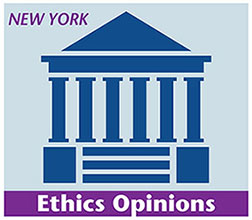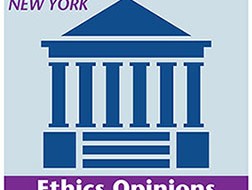Recent N.Y. Ethics Opinions: June/July 2016
By Tyler Maulsby, Associate, Frankfurt Kurnit Klein & Selz
Here are summaries of ethics opinions issued in December 2015 and January 2016. The opinions were issued by the NYSBA Committee on Professional Ethics. NYLER will continue to provide updates on new ethics opinions issued by these and other ethics committees in New York State.
For information about how to obtain an ethics opinion from the NYS Bar Association Committee on Professional Ethics, please visit http://www.nysba.org/Ethics/.
NEW YORK STATE BAR ASSOCIATION OPINIONS
NYSBA Ethics Op. 1080 (Dec. 2015)
Governmental Parties and the ‘No-Contact’ Rule
In Opinion 1080, the inquiring lawyer represented a client against a municipal agency in a dispute over a real property assessment. The lawyer mainly communicated with the attorney for the municipality and both lawyers had entered appearances in the case. During the course of the litigation, the public official in charge of the municipal agency that was a party to the action contacted the lawyer and requested that the lawyer communicate directly with him. The Opinion addresses whether the lawyer may communicate with the public official under Rule 4.2 of the New York Rules of Professional Conduct (New York Rules), which prohibits a lawyer from communicating with a party who is represented by counsel without first obtaining consent from that party’s lawyer or unless the lawyer is “authorized by law” to do so. The Opinion concludes that the lawyer would be prohibited from communicating with the public official under Rule 4.2 because it was clear that the municipality was represented by counsel. Citing prior ethics opinions, the Opinion reasons: “once there is an indication that counsel has been designated by a party, whether governmental unit or otherwise, with regard to a particular matter, all communications concerning the matter must thereafter be made with the designated counsel except as provided by law.” Thus, the lawyer must first obtain consent from the municipality’s lawyer before communicating directly with the public official. The Opinion also concludes that the type of communication at issue does not meet the “authorized by law” exception in Rule 4.2. If the lawyer were simply attempting to “petition the government” within his First Amendment rights, Rule 4.2 would not apply, however, because the lawyer is litigating against the agency, he must first seek permission from the municipal agency’s attorney before speaking with the public official.
The full Opinion is available at: http://www.nysba.org/CustomTemplates/Content.aspx?id=60761.
NYSBA Ethics Op. 1081 (Jan. 2016)
Legal and Non-Legal Services and the Unauthorized Practice of Law
In Opinion 1081, two lawyers were employed by a debt management company (the “Company”) that was run by a non-lawyer. The Company wished to offer services whereby the lawyers would provide certain advice and counseling to the Company’s clients. The Company also proposed an incentive structure where the salaries of the lawyers would be augmented by $100 for each account that was settled for more than $10,000. Finally, the lawyers were concerned that they would be unable to properly counsel all of the Company’s clients due to the number of cases the Company handled. The threshold question, the Opinion concludes, is whether the services the lawyers would be providing are “legal services, non-legal services, or a combination of the two.” If any of the proposed services are “legal services,” then the lawyers would be bound by the New York Rules. If the services are non-legal in nature, then some of the New York Rules may apply but others may not. If the services are a combination of legal and non-legal services relating to the same matter then under Rule 5.7(a)(1) the New York Rules would apply to both the legal and non-legal services. Because the definition of “legal services” is a question of law, the Opinion does not opine on whether the services at issue are in fact “legal services,” but notes that “it seems likely that some of the activities of the [Company]…probably are legal services.” If the services at issue are legal services then the lawyers may be violating New York Rule 5.5, which prohibits lawyers from aiding a non-lawyer in the unauthorized practice of law, as well as New York Rule 5.4, which prohibits lawyers from sharing legal fees with non-lawyers. With regard to the proposed bonus compensation, the Opinion concludes that such an arrangement would create a potential personal interest conflict under Rule 1.7(a)(2) because it could encourage the lawyer to settle a matter on terms less favorable to the client. Finally, the Opinion concludes that, assuming the New York Rules applied to the scenario, the lawyers would also have a duty of competent representation to the clients under Rule 1.1, and thus, would not be able to accept more matters than they could manage.
The full Opinion is available at: http://www.nysba.org/CustomTemplates/Content.aspx?id=61395.
NYSBA Ethics Op. 1082 (Jan. 2016)
Providing Legal Services to Clients of a Non-Legal Entity
Opinion 1082 addresses whether a lawyer employed by a finance company may provide legal services to the company’s clients or whether the lawyer may assist the company’s clients with pro se filings. The Opinion concludes that the lawyer may not provide legal services to the company’s clients because doing so would violate Rule 5.5(b), which prohibits a lawyer from aiding a non-lawyer in the unauthorized practice of law. The Opinion notes that any compensation arrangement would also likely violate Rule 5.4(a)’s prohibition on sharing legal fees with non-lawyers. The Opinion also concludes that the lawyer may not help the company’s client’s “ghostwrite” pleadings for the same reasons. The Opinion reasons “it would make no difference whether the lawyer’s name appeared on the documents. The problem would be that the Company is engaging in the unauthorized practice of law. Omitting the lawyer’s name from any documents would not cure the problem.” The Opinion also notes that the lawyer’s failure to disclose his participation may also violate Rule 8.4(c), which requires a lawyer to refrain from behavior involving dishonesty, deceit or misrepresentation. Readers should also take note of N.Y. County Lawyers’ Assn. Op. 742 (Apr. 16, 2010) (not cited in Opinion 1082), which concludes that it is generally permissible for a lawyer to ghostwrite pleadings for a pro se client without disclosing the fact of the lawyer’s participation, unless disclosure is necessary by law or court rule.
The full Opinion is available at: http://www.nysba.org/CustomTemplates/Content.aspx?id=61396.
Get CLE Credit for this month’s articles (June/July 2016).
DISCLAIMER: This article provides general coverage of its subject area and is presented to the reader for informational purposes only with the understanding that the laws governing legal ethics and professional responsibility are always changing. The information in this article is not a substitute for legal advice and may not be suitable in a particular situation. Consult your attorney for legal advice. New York Legal Ethics Reporter provides this article with the understanding that neither New York Legal Ethics Reporter LLC, nor Frankfurt Kurnit Klein & Selz, nor Hofstra University, nor their representatives, nor any of the authors are engaged herein in rendering legal advice. New York Legal Ethics Reporter LLC, Frankfurt Kurnit Klein & Selz, Hofstra University, their representatives, and the authors shall not be liable for any damages resulting from any error, inaccuracy, or omission.
Related Posts
« Careless Keystrokes & Bad Decisions: New York Law on Inadvertent Disclosure (Part 2) N.Y. Court of Appeals Narrowly Interprets Common Interest Exception to Attorney-Client Privilege »












